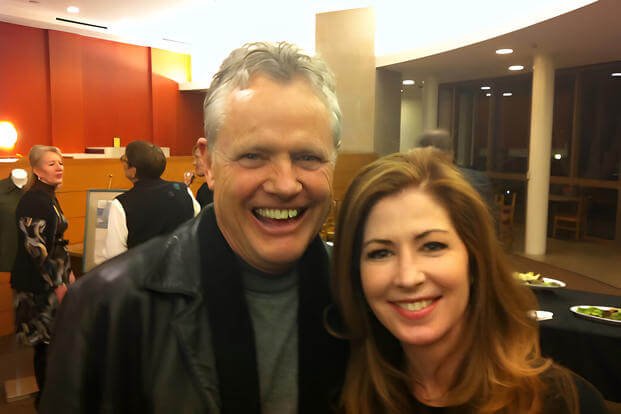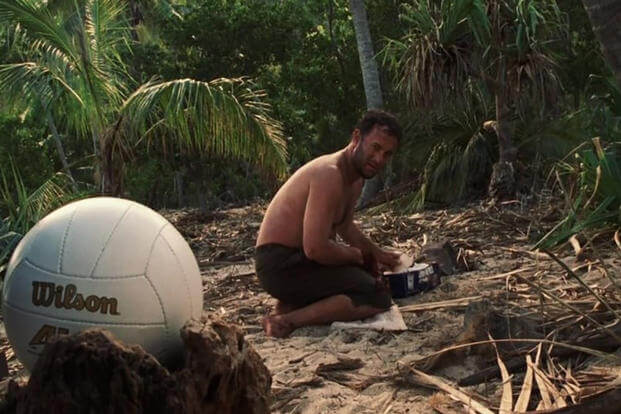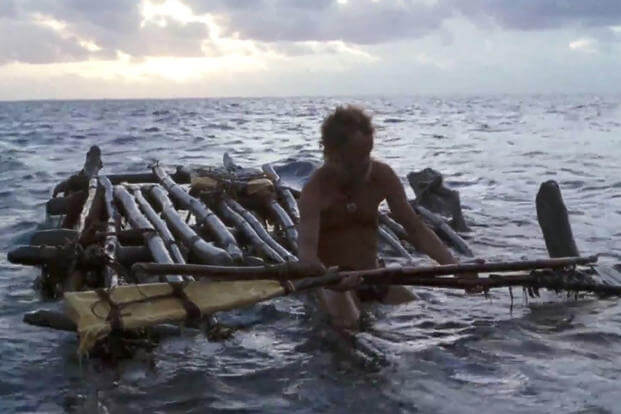During the Vietnam War, William Broyles Jr. was deployed as an infantry platoon commander in the Marine Corps and visited a Navy hospital there full of severely injured troops. Peering through a window into the hospital, "it looked like that scene in 'Raiders of the Lost Ark' where they take the Ark of the Covenant into the warehouse, and all you can see are boxes," Broyles recalled. "All I could see were wounded teenagers."
The sight so unnerved Broyles that he fainted and broke his nose. That experience led to Broyles' co-creating "China Beach," a late-1980s television series about an Army nurse during the Vietnam War. A renowned screenwriter, Broyles has written several other hit TV shows and movies, including "Cast Away" -- which starred Tom Hanks ("Saving Private Ryan") as a FedEx executive, Chuck Noland, whose company plane crashes into the ocean. The only survivor, Noland, is eventually forced to make his way off a deserted island.
In a recent interview with Military.com, Broyles -- whose other writing credits include “Apollo 13,” “Flags of Our Fathers” and “Jarhead” -- reveals how the humanity of his Vietnam experience inspired "Cast Away," which will mark the 25th anniversary of its release this year.
Read Next: 'Terminal List' Prequel Series 'Dark Wolf’ Delves into the Darker Side of Warfare
Military.com: What inspired you to write "Cast Away"?
Broyles: "One of the things that helped motivate me in the writing of it was that I felt like it was a metaphor for my Vietnam experience. The main character is living an ordinary life and is suddenly swept away and dropped into a strange world where he doesn't necessarily have the skills and experience to survive. He has to learn under very difficult conditions. He has to dig deep into himself and find the qualities and abilities to survive and find meaning. He has to find a community, even if it is with a volleyball, to help [him] get through it.
“Then, to finally return and find some difficult situations. You find the world you left has mostly stayed the same, although you're very changed. No one has much interest in what you did, and no one can really understand, so you feel isolated as much as you felt in the strange world you were in.
"There was always hope. The line he says, 'Tomorrow the sun will rise and who knows what the tide will bring?" I wanted it to be a hopeful thing and end with him having his whole life ahead of him. It is a metaphor for any difficult situation that life throws your way."

Military.com: What other experiences did you draw upon during the writing process?
Broyles: "When I went to the dedication of the Vietnam War Memorial in 1982, I was looking at the black granite with the names and started seeing faces. You know, why me? Why did I survive? Why are they back there? All the survivor’s guilt. Then I started to see some Vietnamese faces. They were random, [and] it was like a portal seeing through between life and death. Who were those guys on the other side of those green tracer bullets? Who were those guys that survived the B-52 strikes in the jungle, being napalmed and crawling naked with satchel charges under our wires into our camps at night?
"I went back to Vietnam in 1984 and was one of the first combat veterans to go back to the battlefields. I traveled 3,000 miles and met all of these people -- generals, the foreign minister, everybody. We debated the war, and they told me what it was like to be under a B-52 strike. The ground shakes when they are bombing even miles away, and you think, 'Oh, my God.' I sat around the fire with Vietnamese veterans, and we exchanged war stories. They treated me with such respect and were happy to see me. The people in the villages had forgotten the war, and in some ways, my men and I had more in common with them than we did with the people and troops back in the rear and in Da Nang.

"I am reminded of when I woke my Marines up to tell them that Da Nang was being rocketed. The Marines in the bush started to cheer. Those guys in the rear getting hot showers, good food and relaxing were now getting a taste of the war. There was a lot of resentment toward the people in the rear. This experience serves as a placeholder for the people back in the U.S. The Viet Cong were out in the jungle with us. They were in the mud and being shelled. We were two pieces of the same thing. Like the portal of the Vietnam wall, the line between life and death is like the line between you and the enemy. It is the most brutal final line that living people can draw. The humanity shown to me by the Vietnamese ... really stuck with me."
Military.com: What further research did you conduct for "Cast Away"?
Broyles: "I went to the Sea of Cortez [in Mexico] to see what it would be like to live on a deserted island. I was dropped off by Mormon hippies on a beach with nothing. I had to survive, build shelter, open a coconut, get some water, all of it. I speared a stingray and ate it raw. I tried to eat raw crab and just couldn't do it. Like Hanks' character in the film, I tried to make fire, and those Boy Scout skills didn't work.
"The Mormon hippies were like two sand dunes over. They were there for emergencies. I just didn't want to eat another raw stingray. The wind changed and blew the smell of freshly cooked bacon over into my little shelter. They were playing the Grateful Dead -- and I wanted to be completely authentic -- but I've got to have fire. I went over, and they told me how to make fire via the trough method. I went back and made it work. I had a big bonfire on the beach and sang "Come on, baby, light my fire," like Hanks did in the film. All of that is based on real experience.

"I stayed a few more nights and realized I was really lonely. Maybe I could go talk to the hippies. No, I couldn't do that because the character can't. On the third morning, a volleyball had washed up on the beach, swear to God. I took some seashells and seaweed and put them on the ball. I started talking to it. Upon departure, I tossed the ball aside and then thought, 'Idiot!' That's the movie! The movie is about how we are social creatures, and we need humanity. We need families. We need friends and other people. Even if you don't have one, you can turn a volleyball into a companion that will get you through.
"It was the key to the whole movie. I didn't think it up; I'm not that smart. The tide brought it to me. That's why he says at the end, 'The sun will rise tomorrow, and who knows what the tide will bring?' The tide brought the porta-potty that he used to make his raft to get off the island. I just paid attention. It's so much [more relevant] that it was a Wilson volleyball and not a Mizuno. I don't think it would have been quite so good if Tom Hanks had been yelling, 'Mizuno! Mizuno!' instead of Wilson. To me, the most emotional part of the film is when he loses Wilson. That's when the character surrenders to the ocean. It's important when the whale shows up, because it was his first interaction with another creature, and the whale helps save his life.
"We are all connected in life. The companions we make under those difficult settings of trying to survive on an island alone, and his emotional connection to Wilson is not unlike the camaraderie and connection you have to your fellow Marines in combat. If I hadn't had that experience in Vietnam, I'm not sure I could have written 'Cast Away' in the same way."
For more of Military.com’s interview with Broyles, click on the interview below:
Keep Up With the Best in Military Entertainment
Whether you're looking for news and entertainment, thinking of joining the military or keeping up with military life and benefits, Military.com has you covered. Subscribe to the Military.com newsletter to have military news, updates and resources delivered straight to your inbox.

















